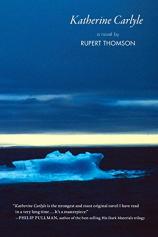Katherine Carlyle
Review
Katherine Carlyle
Although the theme of personal discovery is a common one, never before has it been tackled from the unique perspective offered in Rupert Thomson’s beautifully written novel, KATHERINE CARLYLE. Highly original, somber and breathtakingly cinematic, it tells the story of Kit, a girl on the run from her melancholy life in Rome. As she struggles to shake the pain of losing her mother and her disappointment in her distant father, she becomes fiercely independent, pursuing validity and empowerment in wild new surroundings.
Drawing upon the modern technology of IVF (in vitro fertilization), Thomson begins the story by describing Kit’s unusual birth --- eight years after she was created in a lab from her parents’ genetic material. Though her birth was a miracle of sorts, it was not without a price, as her mother developed cancer from the IVF treatments and passed away. Her father, a famous newscaster, soon busied himself with work, often disappearing for long stretches of time, separating Kit from the warmth of a family. Now 19, Kit has become resentful of her losses and decides to take control of her life, allowing the universe to guide her as no one else ever has.
As Kit relays her foggy memories of the frozen period of time she spent waiting to be implanted, she reveals herself to be both highly insightful and painfully self-aware. Her “memories” of this time, though clearly imagined, are so vivid and poignant that they seem no less real than the reader’s own memories. Combining these traits with an affinity for signs and messages delivered to her from some unknown higher power, Kit begins to plan her disappearance, a trip she calls an “experiment with consequence.” At first, it seems that she is keeping secrets from the reader, as her choices are so arbitrary it is nearly discomforting, suggesting that there is, in fact, a method to her madness.
"It is rare that an author can create a protagonist so wholly original and flawed and still maintain the reader’s interest and attention. Thomson has truly outdone himself with this fascinating work."
In this way, the novel takes on the tone of a noir mystery, with dark clues popping up with obvious importance but no clear directions or meanings. For instance, when Kit overhears a couple discussing their friend Klaus, who lives in Berlin, she instantly invents a last name for him, quickly translating it to German and noting the general area where this Klaus may live. She decides that this is an obvious sign telling her where the first part of her journey will begin. In mere days she has emptied her accounts, disposed of her cell phone and computer, and departed for Berlin.
In the second part of the novel, we follow Kit as she tracks down Klaus and begins relationships with him and a few other men, though none are wholly romantic or sexual. Although she is only 19, she presents an uncanny ability to manipulate the people around her, speaking in short, enigmatic phrases that entice the men she interacts with while allowing them to project their desires onto her. In this way she puts herself entirely in control, an intoxicating feeling for a girl like her. Her abilities are certainly fascinating to read about, but I won’t pretend that she doesn’t come off as pretentious, a fact that can be a bit taxing on the reader --- though it is certainly worth the payoff of Thomson’s breathtaking talent for sparse, vivid prose.
Interspersed with her daily activities are her vivid imaginings of what may be happening to her father, her former lover and the strangers she meets. These dreamy sequences are a true testament to Thomson’s prowess, as they are so well written that the reader becomes fully immersed in their reality, even when it is clear that they are only dreams. As the reader watches Kit adjust to Berlin, already making plans for her next disappearance, it is difficult at times not to shout “Wait! That’s unsafe!” as Kit takes off with strangers or walks through dangerous paths. Still, this is the thrill of KATHERINE CARLYLE, the voyeuristic wish that the reader, too, could drop everything and take off; Kit allows us to play out this possibility.
Before long, Kit must take off again, embarking for colder climates as she travels north, first for Russia and then for a Russian mining settlement near the North Pole. In a poetic way, her journey mimics the one she took following the moment of her conception. Although she never directly acknowledges this (nor does Thomson), it seems that Kit is drawn to a final destination that mimics her original one. In Russia her previously pretentious personality takes itself down a few pegs, with Kit making acquaintances, getting a job and even learning Russian --- and not just short, enigmatic phrases, either. It seems as though she is finally in touch with reality and, despite the bleakness of her surroundings, flourishing.
Although her imagination continues to thrive, it becomes more hopeful and less aggressively condescending of others. With Kit no longer obsessively scanning her surroundings for symbols, the reader is able to discern a few on his own, creating a lovely cyclical feeling. As much as I enjoyed reading KATHERINE CARLYLE, I can’t say it wasn’t one of the stranger contemporary works I’ve ever read --- though this is not an insult. It is rare that an author can create a protagonist so wholly original and flawed and still maintain the reader’s interest and attention. Thomson has truly outdone himself with this fascinating work.
Reviewed by Rebecca Munro on November 13, 2015
Katherine Carlyle
- Publication Date: October 6, 2015
- Genres: Fiction, Literary Fiction, Women's Fiction
- Paperback: 304 pages
- Publisher: Other Press
- ISBN-10: 1590517385
- ISBN-13: 9781590517383





